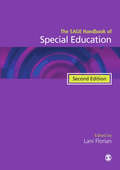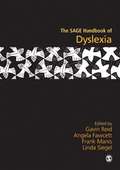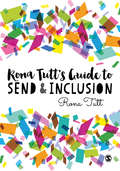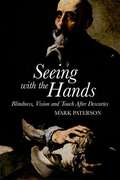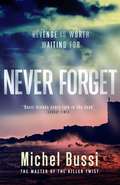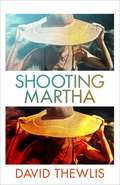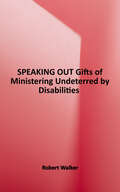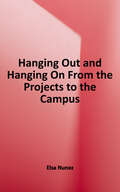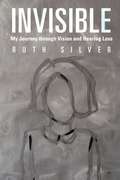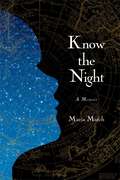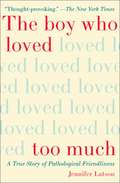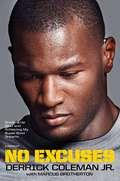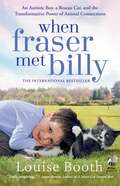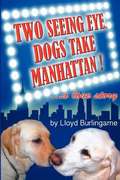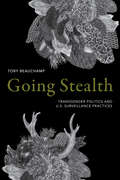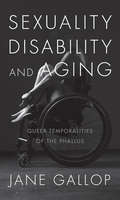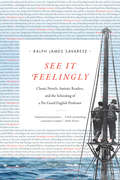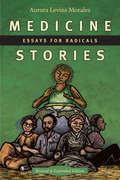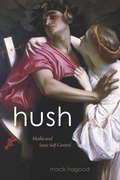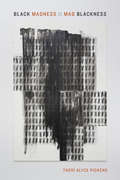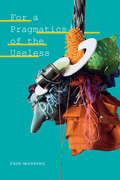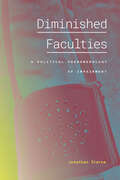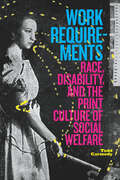- Table View
- List View
The SAGE Handbook of Special Education: Two Volume Set
by Lani FlorianThe second edition of The SAGE Handbook of Special Education provides a comprehensive overview of special education, offering a wide range of views on key issues from all over the world. The contributors bring together up-to-date theory, research and innovations in practice, with an emphasis on future directions for the role of special education in a global context of inclusion. This brand new edition features: " New chapters on families, interagency collaboration and issues of lifelong learning " The UN Convention on the Rights of Persons with Disabilities " Policy reform proposals " Equity and social justice in education " The impact of new thinking on assessment " Issues and developments in classification " The preparation and qualifications that teachers need The Handbook's breadth, clarity and academic rigour will make it essential reading for researchers and postgraduate students, and also for practitioners, teachers, school managers and administrators.
Working with Parents of Children with Special Educational Needs (Hands on Guides)
by Maggie Smith Chris DukesIncludes CD-Rom `This very timely book...aims to support practitioners to work in partnership with parents, particularly those parents whose children have special or additional needs...It very clearly sets out the principles, legislative framework and processes which are essential knowledge for all SENCOs and managers in early years settings' - Early Years Update `The book has a positive approach to all aspects of working with parents and children...It's a book you can easily dip in and out of and is written in plain English...There aren't many textbooks I can read from cover to cover but this is one - I found it really interesting and enlightening. Score - 10 out of ten' - National Childminding Association `In short, this book provides almost everything you need in order to work successfully with parents' - Early Years Educator Are you looking for advice on how to work successfully with parents? Every practitioner knows that it is vitally important to work well with parents and make the relationship a positive and productive one, to ensure the best support for the child with special educational needs. This book offers clear strategies for ways to forge successful and lasting relationships with parents. It includes: - advice on working together with parents to improve the child's learning - strategies for communicating effectively with parents - help for the pre-school SENCO, showing how they can lead the process - tips for building successful links with other related professionals - activities and case studies - a CD Rom with checklists and useful photocopiable material. This book is ideal for all those working with the 0 to 5 age range, such as pre-school practitioners, nursery managers, advisory teachers, SENCOs, Inclusion Officers and Child Care and Education students and tutors. Chris Dukes and Maggie Smith are both Area SENCOs who work closely with pre-school SENCOs and Managers on a daily basis.
The SAGE Handbook of Dyslexia
by Gavin Reid Linda Siegel Dr Angela Fawcett Frank ManisThe SAGE Handbook of Dyslexia is a comprehensive overview of a complex field. It is a rich, critical assessment of past and present theory and current research, which also looks to the future. The editors have brought together key figures from the international academic world - both researchers and practitioners - to examine the relationships between theoretical paradigms, research and practice, and to map new areas of research. The book has 5 main sections: - neurological/genetic perspectives - cognitive and learning perspectives - educational influences - beyond school - international perspectives.
Rona Tutt’s Guide to SEND & Inclusion
by Rona TuttHow to give children and young people who have SEN and disabilities (SEND), the support they need in the environment where they feel most fully included, should be a key concern of every teacher and practitioner. Drawing on her years of experience and conversations with a range of professionals, as well as the thoughts of children, young people and families who have encountered a number of settings, SEND expert Dr Rona Tutt examines both the benefits of the recent SEND reforms and also the opportunities that have been missed to meet needs more flexibly. Content focuses on: Creating a climate where all children can thrive An appreciation for the variety of innovative ways school leaders are meeting the needs of students A consideration of the wider context of SEN from local to national level Clear and accessible, this is an inspiring read for anyone concerned with how individual needs are best met, rather than where their education takes place.
Seeing with the Hands: Blindness, Vision and Touch After Descartes (Edinburgh University Press)
by Mark PatersonDrawing upon the writings of Descartes, Voltaire, Locke and others, the author reflects upon the philosophical understanding of blindness and what it suggests about the nature of perception. Central to the discussion is the Molyneux Question first posed in 1688: "Suppose a man born blind, and now adult, and taught by his touch to distinguish between a cube and a sphere of the same metal, ... and the blind man be made to see: whether by his sight before he touched them, could he now tell which is the globe and which the cube?" Patterson discusses cases of people blind from early in life who have had vision restored through surgery, and explores the similarities and differences between visual and tactile perception. The final chapter examines the autobiographical writings of blind authors including Helen Keller, John Hull, and Georgina Kleege, and how such works are understood by sighted readers.
Never Forget: The #1 bestselling novel by the master of the killer twist
by Michel BussiA #1 INTERNATIONAL BESTSELLER A SUNDAY TIMES CRIME BOOK OF THE MONTH'Outrageously entertaining' The Times'A tantalising story that wraps the reader in myriad enigmas - utterly spellbinding'Daily Mail'As exhilarating as Bussi's breakthrough novel After the Crash' The Sunday Times 'Agatha Christie updated and then cranked up to 11: a blast' Shots Magazine REVENGE IS WORTH WAITING FOR... Jamal loves to run. But one morning - as he is training on a path winding up a steep cliff - he stumbles across a woman in distress.It's a matter of seconds: suddenly she is falling through the air, crashing on the beach below.Jamal is only an unlucky bystander - or is he?His version of events doesn't seem to fit with what other eyewitnesses claim to have seen. And how to explain the red scarf carefully arranged around the dead woman's neck?Perhaps this was no accident after all.Or perhaps there is something more sinister afoot - a devilish plan decades in the making, masterminded by someone hell-bent on revenge.MICHEL BUSSI: THE MASTER OF THE KILLER TWISTBeloved by readers... 'I didn't anticipate all the twists and turns in this cleverly plotted novel''The final twist is a bit of a jaw dropper''Twists and turns aplenty!''A twisting, turning story which clobbers you with a number of cracking twists!''Fast-paced and chock full of twists, turns and red herrings' ...and critics 'A novel so extraordinary that it reminded me of reading Steig Larsson for the very first time . . . I doubt I'll read a more brilliant crime novel this year' Sunday Times on After the Crash'A dazzling, unexpected and haunting masterpiece' Daily Mail on Black Water Lilies'Inventive, original and incredibly entertaining' Sunday Mirror on Don't Let Go'Combines an extraordinarily inventive plot with characters haunted by long-ago events - and demonstrates why he has such a hold on readers' Sunday Times on Time is a Killer
Shooting Martha
by David Thewlis'A riotously good novel, witty and earnest, brimming with sharply drawn characters and creeping suspense. David Thewlis is a fabulous writer' Anna Bailey, Sunday Times bestselling author of Tall BonesCelebrated director Jack Drake can't get through his latest film (his most personal yet) without his wife Martha's support. The only problem is, she's dead...When Jack sees Betty Dean - actress, mother, trainwreck - playing the part of a crazed nun on stage in an indie production of The Devils, he is struck dumb by her resemblance to Martha. Desperate to find a way to complete his masterpiece, he hires her to go and stay in his house in France and resuscitate Martha in the role of 'loving spouse'.But as Betty spends her days roaming the large, sunlit rooms of Jack's mansion - filled to the brim with odd treasures and the occasional crucifix - and her evenings playing the part of Martha over scripted video calls with Jack, she finds her method acting taking her to increasingly dark places. And as Martha comes back to life, she carries with her the truth about her suicide - and the secret she guarded until the end.A darkly funny novel set between a London film set and a villa in the south of France.A mix of Vertigo and Jonathan Coe, written by a master storyteller.PRAISE FOR DAVID THEWLIS'S FICTION 'David Thewlis has written an extraordinarily good novel, which is not only brilliant in its own right, but stands proudly beside his work as an actor, no mean boast' Billy Connolly'Hilarious and horror-filled' Francesca Segal, Observer'A fine study in character disintegration... Very funny' David Baddiel, The Times'Exquisitely written with a warm heart and a wry wit... Stunning' Elle'Queasily entertaining' Financial Times'A sharp ear for dialogue and a scabrously satiric prose style' Daily Mail'Laugh-out-loud, darkly intelligent' Publishers Weekly'This is far more than an actor's vanity project: Thewlis has talent' Kirkus
Speaking Out: Gifts of Ministering Undeterred by Disabilities
by Edited by Robert L. WalkerReaders of "Speaking Out: Gifts of Ministering Undeterred by Disabilities" will enter the worlds of one Episcopal and 24 United Methodist ministers who cope with various forms of disabilities. Read how each one is a living testimony that will surprise, inspire, and remind you that they are people with God-given gifts who were spiritually strengthened during their individual life journeys, all the while remaining faithful to their respective calls to church ministry. <p><p>Unfortunately, people with disabilities frequently experience physical and discriminatory barriers, several of which are described by the contributors to this book; undeterred, they overcame or are overcoming the barriers through grace, resiliency, and support from many sources. The book focuses on ministers, but their stories are applicable to non-ministerial persons in our all too common negating ways of both the sacred and secular societies. <p><p>This book is sponsored by the United Methodist Association of Ministers with Disabilities (UMAMD), and all royalties from sales of the book will go to the UMAMD in support of its activities.
Hanging Out and Hanging On: From the Projects to the Campus
by Elsa NunezThis book chronicles the progress of students from Hartford and Manchester, Connecticut, who are enrolled in the Dual College Enrollment Program (DCEP) at Eastern Connecticut State University. <p><p>“Hanging Out” sets the stage for describing the program by first reaching back in time to tell of Dr. Núñez’s own beginnings in Puerto Rico and Newark, New Jersey, of her struggles as a non-English speaking elementary school student and her triumphs in high school and college. The next section of the book describes the lives of Latinos in Connecticut and the social, economic, and educational challenges they have faced over time. Her personal experiences and desire to improve the lives of the underprivileged led Dr. Núñez to create the DCEP Program. <p><p>Through the words of faculty and staff and the personal accounts of six DCEP students, you will read stories of desperation and hope, of struggle and triumph, of heart-breaking failure and stunning success. We hope their story can serve as a model for other communities to follow.
Cultivating diversity and inclusion: using global and multicultural children's literature in grades K-5, Second Edition
by Paula Saine"Cultivating Diversity and Inclusion: Using Global and Multicultural Children's Literature in Grades K-5 offers children's books from across the world that engages students with cultural language experiences and provides ways to incorporate apps and social media activities in the classroom"--Provided by publisher.
Invisible: My Journey through Vision and Hearing Loss (2nd Edition)
by Ruth SilverRuth Silver's young life was challenged with vision and hearing loss. Inspired by her own experiences and challenges, she founded the Center for Deaf-Blind Persons in Milwaukee, a nonprofit agency dedicated to helping others living with the double disability of deaf-blindness. Ruth's story demonstrates how a resilient spirit can propel a profoundly disabled person forward toward a happy, productive life.
Know the Night
by Maria MutchAn unforgettable memoir on the experience of isolation and the miraculous power of human connection. As a baby, Gabriel's first words and affinity for sign language enthralled his adoring parents. When these words fell away, and his medical diagnoses multiplied, Maria Mutch committed herself entirely to her son's care. Then, for about two years, Gabe slept very little, drawing mother and son into a nocturnal existence of almost constant wakefulness. In breathtaking prose, Maria shares the intensely personal challenges and revelations brought about by this period. As Gabe's sleeping hours dwindled, care took place within an isolated, often frightening world, in which Maria's desire for connection and meaning expanded. She became fascinated with stories of Antarctic exploration, and found a companion in Admiral Richard E. Byrd, an explorer who lived by himself in the polar darkness for months in 1934 and later wrote about his struggle for survival in a book called Alone. Reimagining Byrd's story and interweaving it with her own, Maria illuminates a search for love, understanding and comfort against the terrors of the unknown that will resonate with anyone who has lain awake in the dark, or longed to protect a loved one. Know the Night is a powerful journey into the mysteries of nighttime and the human mind, and a testament to the extraordinary bond between mother and child.
The Boy Who Loved Too Much: A True Story of Pathological Friendliness
by Jennifer LatsonThe poignant story of a boy’s coming-of-age complicated by Williams syndrome, a genetic disorder that makes people biologically incapable of distrust.What would it be like to see everyone as a friend? Twelve-year-old Eli D’Angelo has a genetic disorder that obliterates social inhibitions, making him irrepressibly friendly, indiscriminately trusting, and unconditionally loving toward everyone he meets. It also makes him enormously vulnerable. Eli lacks the innate skepticism that will help his peers navigate adolescence more safely—and vastly more successfully. Journalist Jennifer Latson follows Eli over three critical years of his life as his mother, Gayle, must decide whether to shield Eli entirely from the world and its dangers or give him the freedom to find his own way and become his own person. By intertwining Eli and Gayle’s story with the science and history of Williams syndrome, the book explores the genetic basis of behavior and the quirks of human nature. More than a case study of a rare disorder, however, The Boy Who Loved Too Much is a universal tale about the joys and struggles of raising a child, of growing up, and of being different.
No Excuses
by Marcus Brotherton Derrick Coleman Jr.The first deaf athlete to play offense in the NFL (and win a Super Bowl with the Seattle Seahawks!) relates his inspirational story of hard work and determination in his own words. Great for readers of all ages.The inspirational memoir from the popular current Seattle Seahawks running back Derrick Coleman Jr., who, in just his second year in the NFL, won the 2014 Super Bowl with the Seahawks. Showcasing his unlikely and challenging journey to become the first deaf offensive NFL player, he talks about overcoming internal obstacles and external obstacles (bullies and naysayers) in the course of reaching your true potential.
When Fraser Met Billy: An Autistic Boy, a Rescue Cat, and the Transformative Power of Animal Connections
by Louise BoothIn the spirit of A Street Cat Named Bob and Dewey comes a mother's touching, true story of how a rescue cat named Billy transformed her autistic boy's life.Louise Booth and her husband had always dreamed of having a child. But when their son Fraser was born, Louise immediately knew something was wrong. Fraser was an angry child, prone to frequent screaming fits. When the family moved to the Balmoral Estate (Queen Elizabeth's summer residence), where Louise's husband had been hired to be the Queen's electrician, Louise plummeted into depression, worn down by her son's constant needs. At eighteen months, Fraser was diagnosed with autism and hypotonia, a muscle tone condition that affected his ability to walk and use his hands. Louise and her husband Chris were given the devastating news that Fraser would never go to a mainstream school, and it seemed all hope was lost. Then came Billy. A grey cat who'd been found in an abandoned house and left at a shelter, Billy came home with the family, purred, and laid his paws across Fraser's lap. The two became inseparable from that moment on, and slowly but surely, Billy transformed Fraser's life. Within two years of Billy coming home with them, Louise watched her son move from being a child prone to anxiety, tantrums, and sudden emotional meltdowns to a much calmer, less moody child with a bright future. In their home on the beautiful Balmoral Estate, Billy still acts as Fraser's guardian, never leaving his side at mealtimes and bedtimes or whenever he's feeling low. Their profound bond has immeasurably improved both their lives and the family's, bringing them countless hilarious and touching moments along the way. A Sunday Times bestseller in the UK, When Fraser Met Billy is both a powerful testament to a family's love for their child and a treat for cat lovers everywhere.
Two Seeing Eye Dogs Take Manhattan: A Love Story
by Lloyd BurlingameTo their owners all Seeing Eye dogs are miracle workers. However, there are the rare few, like the two exceptionally stalwart heroes of this book, who triumph brilliantly over the obstacles of a huge city. They are the canine equivalents of the intrepid "Navy Seals. " Undaunted, they meet the challenges of the "Big Apple. " Dodging cars, crowds, and one emergency situation after another, they guide their visually challenged partners safely to any destination. Readers of all ages will be fascinated by these pooches who lavish the gifts of independence, dignity, and freedom on their human partners.
Going Stealth: Transgender Politics and U.S. Surveillance Practices
by Toby BeauchampIn Going Stealth Toby Beauchamp demonstrates how the enforcement of gender conformity is linked to state surveillance practices that identify threats based on racial, gender, national, and ableist categories of difference. Positioning surveillance as central to our understanding of transgender politics, Beauchamp examines a range of issues, from bathroom bills and TSA screening practices to Chelsea Manning's trial, to show how security practices extend into the everyday aspects of our gendered lives. He brings the fields of disability, science and technology, and surveillance studies into conversation with transgender studies to show how the scrutinizing of gender nonconformity is motivated less by explicit transgender identities than by the perceived threat that gender nonconformity poses to the U.S. racial and security state. Beauchamp uses instances of gender surveillance to demonstrate how disciplinary power attempts to produce conformist citizens and regulate difference through discourses of security. At the same time, he contends that greater visibility and recognition for gender nonconformity, while sometimes beneficial, might actually enable the surveillance state to more effectively track, measure, and control trans bodies and identities.
Sexuality, Disability, and Aging: Queer Temporalities of the Phallus
by Jane GallopDrawing on her own experiences with late-onset disability and its impact on her sex life, along with her expertise as a cultural critic, Jane Gallop explores how disability and aging work to undermine one's sense of self. She challenges common conceptions that equate the decline of bodily potential and ability with a permanent and irretrievable loss, arguing that such a loss can be both temporary and positively transformative. With Sexuality, Disability, and Aging, Gallop explores and celebrates how sexuality transforms and becomes more queer in the lives of the no longer young and the no longer able while at the same time demonstrating how disability can generate new forms of sexual fantasy and erotic possibility.
See It Feelingly: Classic Novels, Autistic Readers, and the Schooling of a No-Good English Professor (Thought in the Act)
by Ralph James Savarese“We each have Skype accounts and use them to discuss [Moby-Dick] face to face. Once a week, we spread the worded whale out in front of us; we dissect its head, eyes, and bones, careful not to hurt or kill it. The Professor and I are not whale hunters. We are not letting the whale die. We are shaping it, letting it swim through the Web with a new and polished look.”—Tito Mukhopadhyay Since the 1940s researchers have been repeating claims about autistic people's limited ability to understand language, to partake in imaginative play, and to generate the complex theory of mind necessary to appreciate literature. In See It Feelingly Ralph James Savarese, an English professor whose son is one of the first nonspeaking autistics to graduate from college, challenges this view. Discussing fictional works over a period of years with readers from across the autism spectrum, Savarese was stunned by the readers' ability to expand his understanding of texts he knew intimately. Their startling insights emerged not only from the way their different bodies and brains lined up with a story but also from their experiences of stigma and exclusion. For Mukhopadhyay Moby-Dick is an allegory of revenge against autism, the frantic quest for a cure. The white whale represents the autist's baffling, because wordless, immersion in the sensory. Computer programmer and cyberpunk author Dora Raymaker skewers the empathetic failings of the bounty hunters in Philip K. Dick's Do Androids Dream of Electric Sheep? Autistics, some studies suggest, offer instruction in embracing the nonhuman. Encountering a short story about a lonely marine biologist in Antarctica, Temple Grandin remembers her past with an uncharacteristic emotional intensity, and she reminds the reader of the myriad ways in which people can relate to fiction. Why must there be a norm? Mixing memoir with current research in autism and cognitive literary studies, Savarese celebrates how literature springs to life through the contrasting responses of unique individuals, while helping people both on and off the spectrum to engage more richly with the world.
Medicine Stories: Essays for Radicals
by Aurora Levins MoralesIn this revised and expanded edition of Medicine Stories, Aurora Levins Morales weaves together insights and lessons learned over a lifetime of activism to offer a new theory of social justice. Calling for a politics of integrity that recognizes the complicated wholeness of individual and collective lives, Levins Morales delves among the interwoven roots of multiple oppressions, exposing connections, crafting strategies, and uncovering the wellsprings of resilience and joy. Throughout these twenty-eight essays—twenty-one of which are new or extensively revised—she exposes the structures and mechanisms that silence voices and divide movements. The result is a medicine bag full of techniques and perspectives to build a universal solidarity that is flexible, nuanced, and strong enough to fundamentally shift our world toward justice. Intimately personal and globally relevant, Medicine Stories brings clarity and hope to tangled, emotionally charged social issues in beautiful and accessible language.
Hush: Media and Sonic Self-Control (Sign, Storage, Transmission)
by Mack HagoodFor almost sixty years, media technologies have promised users the ability to create sonic safe spaces for themselves—from bedside white noise machines to Beats by Dre's “Hear What You Want” ad campaign, in which Colin Kaepernick's headphones protect him from taunting crowds. In Hush, Mack Hagood draws evidence from noise-canceling headphones, tinnitus maskers, LPs that play ocean sounds, nature-sound mobile apps, and in-ear smart technologies to argue the true purpose of media is not information transmission, but rather the control of how we engage our environment. These devices, which Hagood calls orphic media, give users the freedom to remain unaffected in the changeable and distracting spaces of contemporary capitalism and reveal how racial, gendered, ableist, and class ideologies shape our desire to block unwanted sounds. In a noisy world of haters, trolls, and information overload, guarded listening can be a necessity for self-care, but Hagood argues our efforts to shield ourselves can also decrease our tolerance for sonic and social difference. Challenging our self-defeating attempts to be free of one another, he rethinks media theory, sound studies, and the very definition of media.
Black Madness: : Mad Blackness
by Therí Alyce PickensIn Black Madness :: Mad Blackness Therí Alyce Pickens rethinks the relationship between Blackness and disability, unsettling the common theorization that they are mutually constitutive. Pickens shows how Black speculative and science fiction authors such as Octavia Butler, Nalo Hopkinson, and Tananarive Due craft new worlds that reimagine the intersection of Blackness and madness. These creative writer-theorists formulate new parameters for thinking through Blackness and madness. Pickens considers Butler's Fledgling as an archive of Black madness that demonstrates how race and ability shape subjectivity while constructing the building blocks for antiracist and anti-ableist futures. She examines how Hopkinson's Midnight Robber theorizes mad Blackness and how Due's African Immortals series contests dominant definitions of the human. The theorizations of race and disability that emerge from these works, Pickens demonstrates, challenge the paradigms of subjectivity that white supremacy and ableism enforce, thereby pointing to the potential for new forms of radical politics.
For a Pragmatics of the Useless (Thought in the Act)
by Erin ManningWhat has a use in the future, unforeseeably, is radically useless now. What has an effect now is not necessarily useful if it falls through the gaps. In For a Pragmatics of the Useless Erin Manning examines what falls outside the purview of already-known functions and established standards of value, not for want of potential but for carrying an excess of it. The figures are various: the infrathin, the artful, proprioceptive tactility, neurodiversity, black life. It is around the latter two that a central refrain echoes: "All black life is neurodiverse life." This is not an equation, but an "approximation of proximity." Manning shows how neurotypicality and whiteness combine to form a normative baseline for existence. Blackness and neurodiversity "schizz" around the baseline, uselessly, pragmatically, figuring a more-than of life living. Manning, in dialogue with Félix Guattari and drawing on the black radical tradition's accounts of black life and the aesthetics of black sociality, proposes a "schizoanalysis" of the more-than, charting a panoply of techniques for other ways of living and learning.
Diminished Faculties: A Political Phenomenology of Impairment
by Jonathan SterneIn Diminished Faculties Jonathan Sterne offers a sweeping cultural study and theorization of impairment. Drawing on his personal history with thyroid cancer and a paralyzed vocal cord, Sterne undertakes a political phenomenology of impairment in which experience is understood from the standpoint of a subject that is not fully able to account for itself. He conceives of impairment as a fundamental dimension of human experience, examining it as both political and physical. While some impairments are enshrined as normal in international standards, others are treated as causes or effects of illness or disability. Alongside his fractured account of experience, Sterne provides a tour of alternative vocal technologies and practices; a study of “normal” hearing loss as a cultural practice rather than a medical problem; and an intertwined history and phenomenology of fatigue that follows the concept as it careens from people to materials science to industrial management to spoons. Sterne demonstrates how impairment is a problem, opportunity, and occasion for approaching larger questions about disability, subjectivity, power, technology, and experience in new ways. Diminished Faculties ends with a practical user’s guide to impairment theory.
Work Requirements: Race, Disability, and the Print Culture of Social Welfare
by Todd CarmodyThroughout the history of the United States, work-based social welfare practices have served to affirm the moral value of work. In the late nineteenth century this representational project came to be mediated by the printed word with the emergence of industrial print technologies, the expansion of literacy, and the rise of professionalization. In Work Requirements Todd Carmody asks how work, even the most debasing or unproductive labor, came to be seen as inherently meaningful during this era. He explores how the print culture of social welfare—produced by public administrators, by economic planners, by social scientists, and in literature and the arts—tasked people on the social and economic margins, specifically racial minorities, incarcerated people, and people with disabilities, with shoring up the fundamental dignity of work as such. He also outlines how disability itself became a tool of social discipline, defined by bureaucratized institutions as the inability to work. By interrogating the representational effort necessary to make work seem inherently meaningful, Carmody ultimately reveals a forgotten history of competing efforts to think social belonging beyond or even without work.
